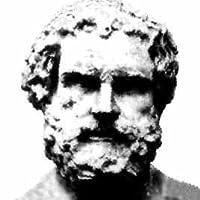
Democritus
O Autorze
Democritus was an ancient Greek philosopher best known for his atomic theory of the universe. He proposed that everything is composed of small, indivisible particles called atoms, which move through the void of space. This radical idea laid the groundwork for modern atomic theory and significantly influenced the development of science. Unlike his predecessor, Leucippus, Democritus provided a more systematic approach to his ideas and his works, although most have survived only in fragments. His philosophy extended beyond physics to ethics and epistemology, where he explored the nature of happiness and the importance of moderation in life.
His thoughts on the nature of reality were revolutionary for his time, suggesting that the universe operates according to fixed laws rather than being influenced by the whims of gods. His ideas were not widely accepted during his lifetime but gained recognition in later centuries, influencing great thinkers such as Epicurus and, much later, modern scientists. Democritus' contributions to philosophy and science remain significant, marking him as one of the pivotal figures in the history of human thought.